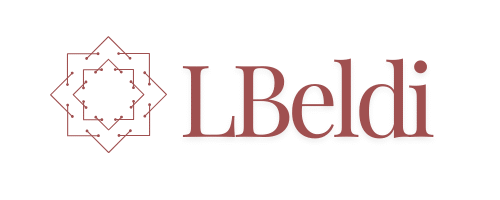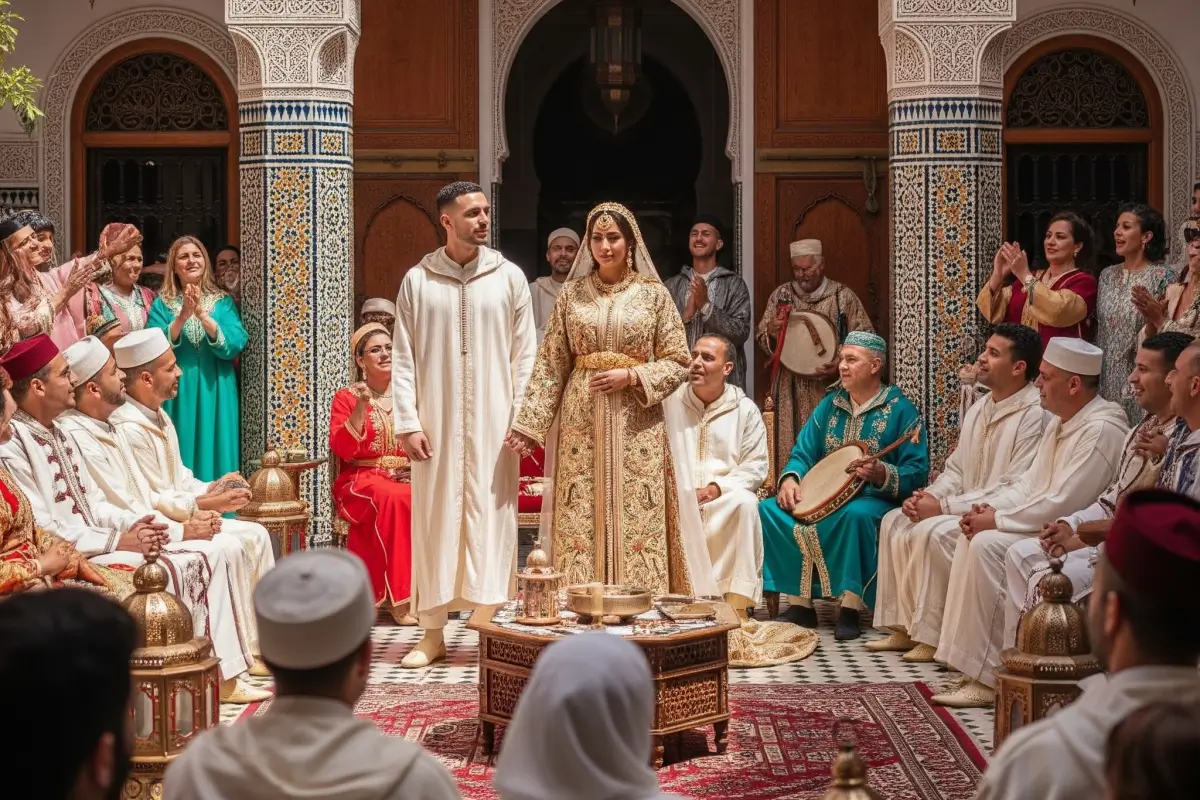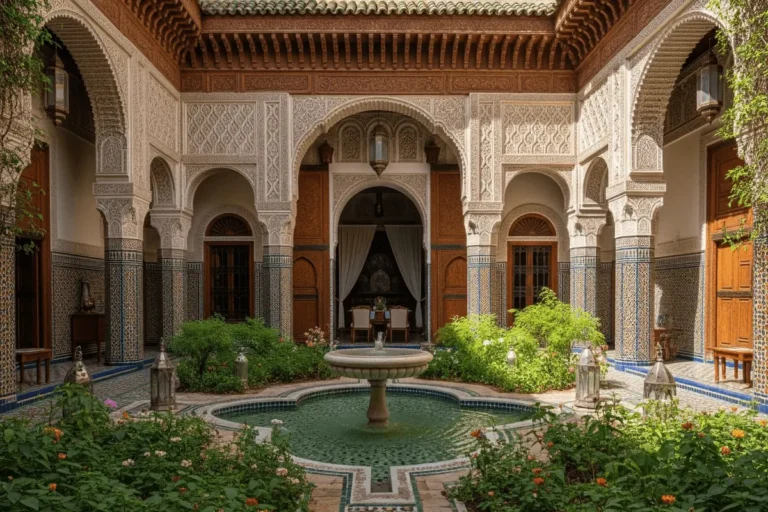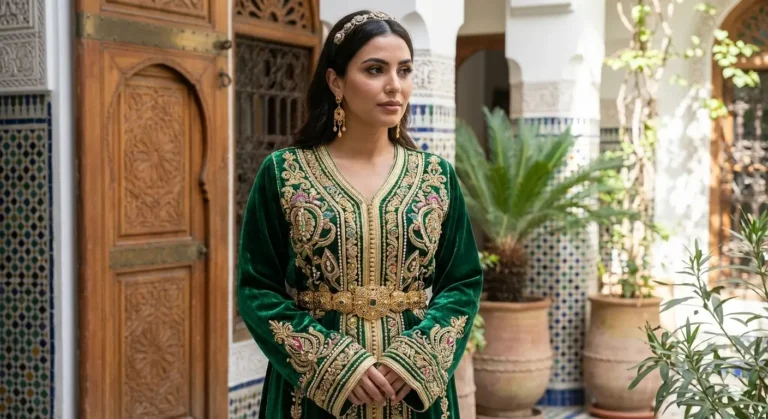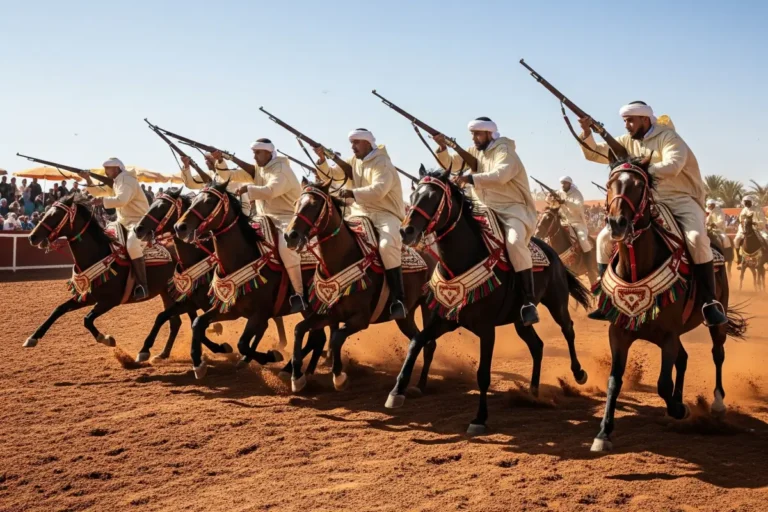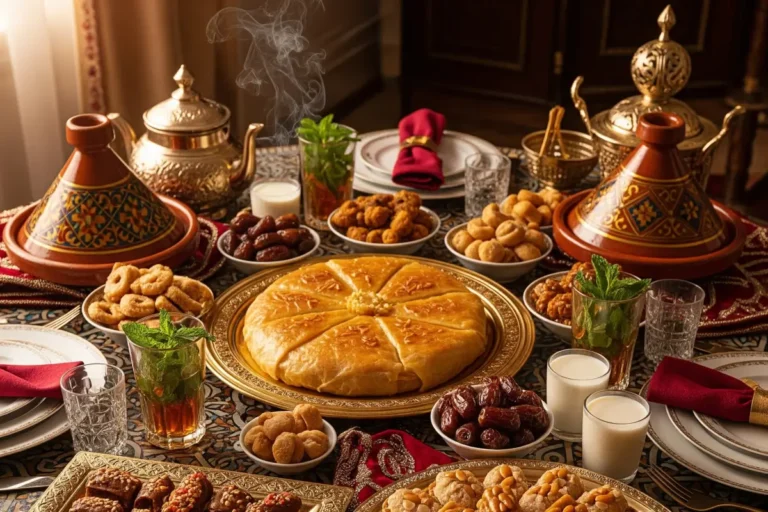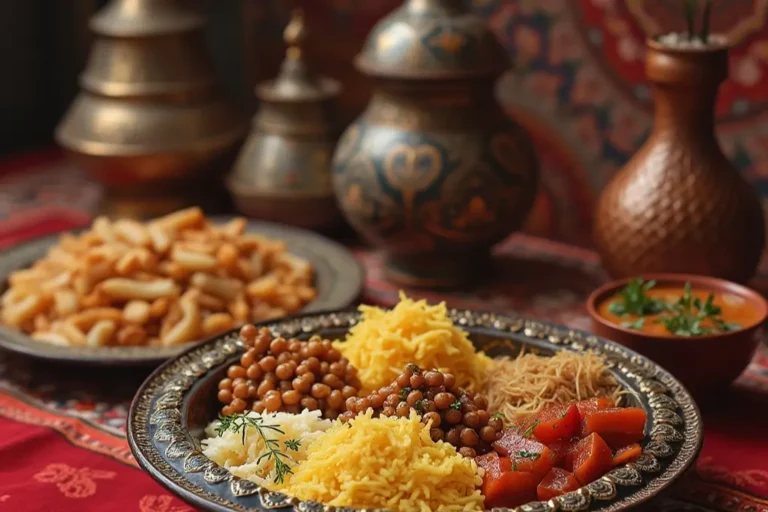Inside the Moroccan Wedding Ceremony
Table of Contents
introduction : Step Into the Splendor of a Moroccan Wedding Ceremony
Marriage marks a significant milestone across cultures, but few can rival the kaleidoscopic beauty and deep symbolism of a Moroccan wedding ceremony. Rooted in centuries-old traditions, Moroccan weddings are a multi-day spectacle that goes far beyond a simple exchange of vows. They are a heartfelt tribute to love, family, and heritage, ceremoniously blending vibrant music, intricate rituals, and sumptuous food.
If you’ve ever had the opportunity—or perhaps even dreamed—of experiencing a Moroccan wedding ceremony, you know how captivating they can truly be. From the bride’s regal entrance on a traditional Amaria to the celebratory rhythms of Moroccan drums, every detail serves as a living testament to Morocco’s rich cultural tapestry. Let’s embark on a detailed journey through all the beautiful rituals, music, and meaning behind the Moroccan wedding experience.
Understanding the Essence of Moroccan Weddings
Moroccan weddings are far more than a formal event—they stand as cultural and religious landmarks in a couple’s life, honoring not only the union of two individuals but also the coming together of two families.
What Sets Moroccan Weddings Apart?
Unlike Western-style, one-day celebrations, Moroccan weddings are sprawling affairs, often lasting two to three days or even longer. They are rooted in community, with friends, neighbors, and extended family actively participating in every step of the journey. The emphasis on family bonds, cultural pride, and spiritual blessings makes these weddings a unique celebration of life.
The Power of Tradition
Moroccan weddings seamlessly weave together the threads of multiple heritages: Islamic, Berber, Arabic, and even Andalusian influences. This cultural richness transforms every gesture into a symbolic act filled with intention. From the bride’s ceremonial attire to the feasting table, all elements reflect a deep connection to the past and a respect for lineage.
Pre-Wedding Rituals: The Foundations of Celebration
The Marriage Contract (Al Akd)
Before the festivities begin, families gather in a formal meeting to finalize the Al Akd, or marriage contract—a crucial religious and legal step. This event focuses on ensuring mutual consent and understanding between the bride and groom. Elders, clerics, and family members come together to witness this agreement, making it as much about familial blessings as it is about compliance with Islamic traditions.
The Hammam Ceremony: Spiritual Renewal
One of the most intimate and significant pre-wedding rituals is the Hammam Ceremony, where the bride enters a traditional bathhouse, or hammam, with close female relatives and friends. This symbolic act of purification prepares her spiritually and emotionally for her new chapter in life. To enhance the experience, natural ingredients like argan oil, fragrant rosewater, and henna are used, emphasizing Morocco’s rich beauty heritage.
Henna Night (Mehndi Ceremony)
No Moroccan wedding is complete without Henna Night, a lively gathering of women filled with laughter, music, and storytelling. During this joyous occasion, the bride’s hands and feet are adorned with intricate henna designs. This is not just about the bride but a celebration that unites women across generations as they chant and dance late into the evening.
The Wedding Day: A Symphony of Rituals and Festivities
Exquisite Bridal Attire
The Moroccan bride is no ordinary bride. She takes center stage dressed in a stunning caftan, a luxurious, hand-embroidered gown that embodies centuries of artisanal craftsmanship. Each gown and its colors—or often, series of multiple caftans worn throughout the day—hold cultural significance. Complementing this majestic attire is an impressive array of gold and silver jewelry, often passed down through generations, symbolizing prosperity and good fortune.
The Amaria: A Grand Entrance
One of the most show-stopping rituals of the wedding is the bride’s arrival on the Amaria—an ornate, elevated chair carried by attendants amidst cheering guests and rhythmic drumming. The grandeur of this tradition signifies the bride’s transition into her new role as a wife while celebrating her as a queen for the day.
Feasting and Its Deep Symbolism
Food at a Moroccan wedding is not merely sustenance; it tells a story of community, abundance, and blessings. Guests are treated to a lavish spread of traditional dishes, each imbued with meaning:
| Dish | Ingredients | Symbolism |
|---|---|---|
| Tagine | Lamb, apricots, almonds, honey | Represents wealth and sweetness |
| Couscous | Semolina, vegetables, meats | A symbol of fertility and unity |
| Pastilla | Phyllo dough, chicken or pigeon, powdered sugar | Reflects layers of love and harmony |
This communal feasting reflects the unity and shared joy of the families as they welcome the couple into a blessed life together.
Music and Dance: The Beating Heart of the Celebration
Moroccan weddings come alive with the sounds of traditional instruments such as the oud (lute) and derbouka (drum). Guests burst into celebratory dances like the Ahidous in Berber culture or the lively Debke, filling the air with joy and spontaneity. Music serves as the soul of the celebration, transcending spoken language to create an emotional connection that unites friends and families.
After the Wedding: Post-Ceremony Rituals
Celebrating the Couple’s New Life
The revelry doesn’t stop after the vows or the wedding night. The following day often involves a communal breakfast or lunch where the couple is celebrated further with blessings, songs, and shared meals. Families express their collective hope for a prosperous and harmonious future for the newlyweds.
The Bride’s Return to Her Family
A deeply meaningful post-wedding tradition is the bride’s ceremonial visit to her childhood home. This symbolizes that while she now belongs to her husband’s household, her bond with her own family remains strong and unbroken.
The Deeper Meaning Behind Moroccan Wedding Customs
Moroccan weddings are about more than aesthetics and celebration. They hold profound cultural and emotional significance:
- Family at the Core: Each step in a Moroccan wedding emphasizes the union not only of two individuals but of their extended families, strengthening communal ties.
- A Celebration of Heritage: Moroccan weddings honor and preserve Islamic and cultural traditions, celebrating Morocco’s unique blend of Berber, Arabic, and Andalusian influences.
- Blessings in Every Element: From the intricate henna patterns to the sweet-spiced tagines, every custom is imbued with symbolic meaning, ensuring that blessings surround the couple in every way.
FAQs About Moroccan Wedding Ceremonies
1. What is the significance of the Amaria in Moroccan weddings?
The Amaria represents the bride’s elevated status and symbolizes her transition into marriage. It is a regal custom that underscores her central role in the ceremony.
2. How long does a Moroccan wedding last?
A Moroccan wedding typically lasts between one to three days, though some families extend the celebrations even longer based on cultural and personal preferences.
3. Why is the henna ceremony important?
Henna’s deep symbolism lies in its ability to protect the couple from negative energy, bring blessings, and celebrate the joyous transition into marriage.
4. Is music vital to a Moroccan wedding?
Absolutely! Music embodies the spirit of celebration, acting as an emotional thread that unites attendees while reflecting the vibrant soul of Moroccan culture.
Conclusion: A Tapestry of Love and Tradition
The Moroccan wedding ceremony is far more than a set of beautiful events—it is an intricate tapestry woven with love, heritage, and community. Every ritual, song, and dish invites you to celebrate life’s most profound connections. Whether you’re a guest, planning your own Moroccan wedding, or simply curious about this cultural marvel, delving into these traditions offers an unforgettable journey of discovery.
Call to Action:
Did reading about Moroccan weddings inspire you? Share this article with friends and family, or leave a comment about what intrigued you most. And if you’re planning your own wedding, why not incorporate some of these vibrant traditions to add a touch of Moroccan magic to your big day?
Did you find this article helpful?
Rate it now and help us deliver better content:
There are no reviews yet. Be the first to share your feedback!
